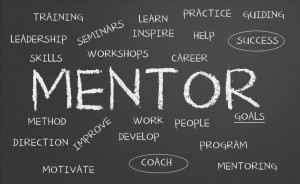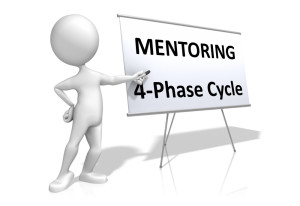by Center for Mentoring Excellence | Aug 25, 2013 | Uncategorized
Some of the many mentoring benefits for individuals include accelerated learning, expanded and diverse perspectives, increased tacit organizational knowledge, additional insights about other business units, improved skills in specific areas ( for example, listening, building relationships). Mentoring also offers individuals a trusted sounding board, role model, and/or go-to individual. Individuals often say that as a result of mentoring they feel more self-aware and self-confident, connected more closely to the organization, and find work more satisfying and meaningful. (more…)
by Center for Mentoring Excellence | Aug 25, 2013 | Mentoring Training

Why should our organization invest in mentoring training? Don’t most people just naturally know how to do it?
The fact of the matter is that most people are either unprepared or underprepared for their mentoring roles. Mentoring training builds more confident and competent mentors and mentees. It promotes participant readiness, creates a standard of mentoring practice, provides guidelines for ensuring mentoring success and offers a safe climate of support.
Senior leaders in our organization are excused from training. Are we missing the boat?
Yes you are. Mentoring is a leadership competency and that means even veteran mentors can grow in the role and become better at the work of mentoring. It is not uncommon to hear comments like, “I am not sure what I am doing here. I’ve mentored people all my life,” or, “I’m showing up because I was told to… not sure there is anything new under the sun on this topic.”  When leaders show up for mentoring it sends a clear message about the value of mentoring and mentoring training that cascades down into the organization. It also enhances the quality of the mentoring experience for everyone gathered in the training room. Programs morph over time and your mentoring program may have changed from when it first began. You will want to make sure everyone is on the same page when it comes to mentoring. Mentoring training is just the ticket.
When leaders show up for mentoring it sends a clear message about the value of mentoring and mentoring training that cascades down into the organization. It also enhances the quality of the mentoring experience for everyone gathered in the training room. Programs morph over time and your mentoring program may have changed from when it first began. You will want to make sure everyone is on the same page when it comes to mentoring. Mentoring training is just the ticket.
What kind of mentoring training is best?
Your mentoring education “menu” should include an array of training opportunities. You will want to consider providing training opportunities for those engaged in formal as well as informal mentoring. Provide options for meeting diverse learning needs at multiple levels and entry points, whether acquiring basic mentoring information and concepts, mentoring relationship preparation, mentoring skill competency, advanced mentoring, and renewal opportunities.
What approach should we take to creating an action agenda for our mentoring training?
There are many innovative practice models and ideas for delivering mentoring education and training, including some very novel approaches. Some organizations adopt an annual thematic approach (usually linked to organizational priorities) to keep mentoring education and training fresh. Some offer introductory, mid-level and advance mentoring courses on a rotating or cyclical basis. Others have certain basic requirements for core courses and electives and award CEUs (continuing education units) or mentoring certificates for fulfilling these requirements.
by Center for Mentoring Excellence | Aug 12, 2013 | Uncategorized
Mentoring is a proven way to promote employee growth and development, accelerate learning, fast track leadership, improve retention, elevate morale, strengthen recruitment and promote diversity. Too often, people step into their mentoring roles without sufficient training, relying on their good intention or past experience to carry the day.

Successful relationships require a mentor to be adept at building trusting relationships with mentees, who often may be intimidated working with a more senior leader, or uncomfortable sharing vulnerabilities or challenges. Mentors need to understand the key components of mentoring, including negotiating agreements, creating accountability assurances and how to avoid common pitfalls and that tend to upend mentoring relationships.
Meet Mike, Kim and Jeff. Each of them had good intentions but missed the mark because they weren’t fully prepared for their role.
In the past, Mike had informally mentored a number of junior associates, and enjoyed these relationships. However, this was the first time he had actually participated in a formal mentoring relationship. After four months, his mentee, Aaron, had made little progress. Aaron’s low level goals were getting him nowhere and he frequently cancelled meetings at the last moment. More than once, Mike encouraged Aaron to become a more active participant in his own growth and development, but nothing seemed to shift. Mike was not enjoying this relationship.
Kim had been assigned as Trina’s mentor. Since she and Trina had worked together on projects, Kim thought it would be easy to mentor her. She assumed that they could skip over the relationship-building component and dive right into goal setting. Kim was confused when Trina seemed to be withholding, and profoundly disappointed when, after three months, the relationship completely stalled out.
Jeff held a deep passion for helping young talent in the company come up through the ranks. He took great pride in his role as a mentor and relished the opportunity to share his wisdom and provide sound advice. He always had a list of business books and journal articles to recommend to help mentees acquire leadership skills. Despite his own enthusiasm for mentoring, his mentees never seemed as satisfied or committed. He didn’t understand why.
Mike, Kim and Jeff all had good intentions. They all wanted to help their mentees grow and develop. Like most mentors, they assumed their past experiences with informal mentoring would be sufficient. As it turned out, they could have each benefited from mentoring training.
With training, Mike would have discovered why Aaron was lacking enthusiasm and energy for achieving his goals. He would have learned how to set expectations up front that put the mentee in the driver’s seat. He would have learned strategies to help his mentee set robust and SMART goals that facilitate growth and development.
Even though Kim knew Trina in a work setting, a successful mentoring relationship requires trust and safety. Mentoring training would have helped Kim understand the importance of taking the time to set the stage for the work ahead. She would not have made the assumption that Trina felt safe enough to be open and honest with a senior colleague. Kim would have learned which questions to ask to get to know Trina in a different way. She would probably have been surprised to learn that she had skipped over the most important phase of the mentoring cycle, preparing the relationship.
 Jeff was driving his mentoring relationships instead of creating a partnership with his mentees. While his mentees might have appreciated the many resources he shared with them, mentoring isn’t about reading books and journals. Mentoring isn’t about listening to the wisdom of the mentor and hearing about their experiences. In this kind of relationship, the mentee never fully engages. Had Jeff had some training under his belt, he would have discovered that open two-way conversation was an essential part of mentoring right from the get-go. He would have learned that the only way for mentees to achieve good results is to feel a sense of ownership in the relationship. Knowing more about the different learning styles of his mentees would have helped him better support them in their learning.
Jeff was driving his mentoring relationships instead of creating a partnership with his mentees. While his mentees might have appreciated the many resources he shared with them, mentoring isn’t about reading books and journals. Mentoring isn’t about listening to the wisdom of the mentor and hearing about their experiences. In this kind of relationship, the mentee never fully engages. Had Jeff had some training under his belt, he would have discovered that open two-way conversation was an essential part of mentoring right from the get-go. He would have learned that the only way for mentees to achieve good results is to feel a sense of ownership in the relationship. Knowing more about the different learning styles of his mentees would have helped him better support them in their learning.
Learning Point: Being an effective mentor requires more than just good intention. It also requires knowledge, competency and skill to be successful. Mentoring training plays a key role in the development all three of these important keys to success. It also impacts the quality of mentoring relationships. Mentors who are well-prepared do indeed report more fulfilling and mutually satisfying mentoring relationships.
by Center for Mentoring Excellence | Jun 28, 2013 | Mentoring Questions

Q: How important is it to reward mentors?
A: It depends on the culture in your organization. Some organizations reward everything. Some do not. Appreciation and recognition go a long way and are often sufficient.
Some institutions of higher education for example offer their mentors release time for mentoring or count mentoring time as committee service time. In professional service firms, a special code is sometimes developed for mentoring so that it is not docked from hours.
Q: What are the right incentives for the mentors to spend more time with mentees?
A: Each organization needs to create its own compelling business case for mentoring that speaks to those engaged in mentoring in significant and meaningful ways. We call it the WIIFM (what’s in it for me). Your WIFFM should speak to the organization benefits, individual benefits in a language that is meaningful to them.
Q: How long should a mentoring relationship last (e.g., 1 year, 6 month, etc.)?
It depends on the goals of the program and/or the nature of the learning goal. There is no “should” standard but most last from 9 months to 18 months. Some last two years and encourage mentoring closure conversations at the end of each year.
Q: Is there a risk in never closing a mentoring relationship, if it is okay with both parties?
A: Without a closure conversation, you lose out on a powerful opportunity to reflect and leverage your learning, and plan your next development step with someone who really knows and gets you.
Q: What is the recommended regular meeting /contact frequency?
A: The rule of thumb is to meet regularly and consistently, whether it is weekly, bi-weekly or monthly. Having a pre-established meeting date on the calendar helps ensure mutual accountability for making sure that meetings take place or are rescheduled.
Q: If your mentor appears always busy and harassed, how do you handle this as a mentee?
A: You might be making assumptions, so check them out! What you see is not always what you get. Engaging in a frank and honest conversation is a start, i.e., “I’m concerned….” “Is this working for you?” Checking in and checking things out once you have established a relationship will help you stay on track.
Q: How do you evaluate the impact of mentoring programs?
A: Carefully! Set goals for each of your mentoring programs and identify success factors. You will want to use qualitative, quantitative and baseline data to measure your success. See Creating a Mentoring Culture in which Lois Zachary discusses the issue of evaluation and measurement in depth.


 When leaders show up for mentoring it sends a clear message about the value of mentoring and mentoring training that cascades down into the organization. It also enhances the quality of the mentoring experience for everyone gathered in the training room. Programs morph over time and your mentoring program may have changed from when it first began. You will want to make sure everyone is on the same page when it comes to mentoring. Mentoring training is just the ticket.
When leaders show up for mentoring it sends a clear message about the value of mentoring and mentoring training that cascades down into the organization. It also enhances the quality of the mentoring experience for everyone gathered in the training room. Programs morph over time and your mentoring program may have changed from when it first began. You will want to make sure everyone is on the same page when it comes to mentoring. Mentoring training is just the ticket.


